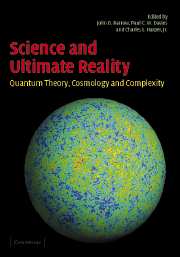Book contents
- Frontmatter
- Contents
- List of contributors
- Foreword
- Editors' preface
- Preface
- Acknowledgments
- Part I An overview of the contributions of John Archibald Wheeler
- Part II An historian's tribute to John Archibald Wheeler and scientific speculation through the ages
- Part III Quantum reality: theory
- Part IV Quantum reality: experiment
- 11 Why the quantum? “It” from “bit”? A participatory universe? Three far-reaching challenges from John Archibald Wheeler and their relation to experiment
- 12 Speakable and unspeakable, past and future
- 13 Conceptual tensions between quantum mechanics and general relativity: are there experimental consequences?
- 14 Breeding nonlocal Schrödinger cats: a thought-experiment to explore the quantum–classical boundary
- 15 Quantum erasing the nature of reality: or, perhaps, the reality of nature?
- 16 Quantum feedback and the quantum–classical transition
- 17 What quantum computers may tell us about quantum mechanics
- Part V Big questions in cosmology
- Part VI Emergence, life, and related topics
- Appendix A Science and Ultimate Reality Program Committees
- Appendix B Young Researchers Competition in honor of John Archibald Wheeler for physics graduate students, postdoctoral fellows, and young faculty
- Index
13 - Conceptual tensions between quantum mechanics and general relativity: are there experimental consequences?
from Part IV - Quantum reality: experiment
Published online by Cambridge University Press: 29 March 2011
- Frontmatter
- Contents
- List of contributors
- Foreword
- Editors' preface
- Preface
- Acknowledgments
- Part I An overview of the contributions of John Archibald Wheeler
- Part II An historian's tribute to John Archibald Wheeler and scientific speculation through the ages
- Part III Quantum reality: theory
- Part IV Quantum reality: experiment
- 11 Why the quantum? “It” from “bit”? A participatory universe? Three far-reaching challenges from John Archibald Wheeler and their relation to experiment
- 12 Speakable and unspeakable, past and future
- 13 Conceptual tensions between quantum mechanics and general relativity: are there experimental consequences?
- 14 Breeding nonlocal Schrödinger cats: a thought-experiment to explore the quantum–classical boundary
- 15 Quantum erasing the nature of reality: or, perhaps, the reality of nature?
- 16 Quantum feedback and the quantum–classical transition
- 17 What quantum computers may tell us about quantum mechanics
- Part V Big questions in cosmology
- Part VI Emergence, life, and related topics
- Appendix A Science and Ultimate Reality Program Committees
- Appendix B Young Researchers Competition in honor of John Archibald Wheeler for physics graduate students, postdoctoral fellows, and young faculty
- Index
Summary
Introduction
Mercy and truth are met together; righteousness and peace have kissed each other.
(Psalm 85:10)In this volume honoring John Archibald Wheeler, I would like to take a fresh look at the intersection between two fields to which he devoted much of his research life: general relativity (GR) and quantum mechanics (QM). As evidence of his keen interest in these two subjects, I would cite two examples from my own experience. When I was an undergraduate at Princeton University during the years from 1957 to 1961, he was my adviser. One of his duties was to assign me topics for my junior paper and for my senior thesis. For my junior paper, I was assigned the topic: “Compare the complementarity and the uncertainty principles of quantum mechanics: Which is more fundamental?” For my senior thesis, I was assigned the topic: “How to quantize general relativity?” As Wheeler taught me, more than half of science is devoted to the asking of the right question, while often less than half is devoted to the obtaining of the correct answer, but not always!
In the same spirit, I would like to offer up here some questions concerning conceptual tensions between GR and QM, which hopefully can be answered in the course of time by experiments, with a view towards probing the tension between the concepts of locality in GR and nonlocality in QM. I hope that it would be appropriate and permissible to ask some questions here concerning this tension.
- Type
- Chapter
- Information
- Science and Ultimate RealityQuantum Theory, Cosmology, and Complexity, pp. 254 - 279Publisher: Cambridge University PressPrint publication year: 2004
- 14
- Cited by



